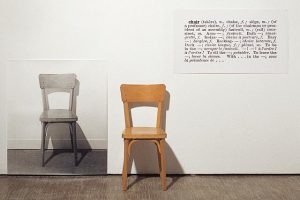 Appel à communication: « Une affaire sans importance ? L’exécution de l’œuvre à l’épreuve de pratiques conceptuelles » (Mendrisio, 6-8 juin 2019)
Appel à communication: « Une affaire sans importance ? L’exécution de l’œuvre à l’épreuve de pratiques conceptuelles » (Mendrisio, 6-8 juin 2019)
Submission deadline: 30 June 2018
The Fourth Swiss Congress of Art History will be held in Mendrisio from 6 to 8 June 2019. Organized jointly by the Swiss Association of Art Historians SAAH and the Institute for the History and Theory of Art and Architecture ISA (Accademia di architettura, Università della Svizzera italiana), it is aimed at art historians from all fields and institutions. Scholars are invited to submit proposals for 20-minute papers within one of the nine panels. Acceptance decisions will be made by the directors of individual panels. We welcome contributions in Italian, German, French, and English in the hope to assemble multilingual panels that would reflect the institutional diversity of the field and foster the young generation of academics.
Please send an abstract (1 page, max. 3000 characters) and a short curriculum vitae including institutional affiliation and contact details to the panel directors by 30 June 2018. Please also Cc the office of the SAAH at vkksgeschaeftsstelle@gmail.com
The SAAH will contribute to the accommodation costs, and all speakers will be exempt from the conference registration fee.
Une affaire sans importance ? L’exécution de l’œuvre à l’épreuve de pratiques conceptuelles.
Dans les années 1960, différents artistes n’ont pas manqué de faire état de l’importance relative qu’ils accordaient à l’exécution de leurs œuvres. Sol LeWitt qualifiait celle-ci en 1967 de simple formalité (« perfunctory affair »), Robert Filliou posait en 1968 son principe d’équivalence (bien fait, mal fait, pas fait) et dans sa Déclaration d’intention de la même année, Lawrence Weiner estimait que pour exister, l’œuvre n’avait pas forcément besoin d’être exécutée. Ce sont là certes des affirmations qui tiennent de l’adoption d’une posture, mais cela n’empêche pas qu’elles permettent de revoir la façon dont est pensée l’exécution des œuvres. La section que nous proposons examine le faire artistique tel qu’il est mis à l’épreuve de sa dissociation d’avec la réalisation matérielle des pièces. Si le « deskilling » ou perte de compétences techniques que déplorait Ian Burn ne s’est pas produit, il n’en reste pas moins qu’il nous faut nous interroger sur ce que faire veut dire pour un-e artiste quand il-elle déclare que l’exécution de l’œuvre ne doit pas nécessairement avoir lieu.
Notre section peut être l’occasion de revenir sur les années 1960, notamment pour passer les déclarations d’artistes au crible de l’examen de leurs œuvres, aussi bien que celle d’étudier le faire dans des pratiques artistiques plus récentes. Les questions soulevées concernent de façon non exhaustive :
- la réception de Duchamp entre refus du métier et labeur manuel;
- des études comme celles de John Roberts ou Maurizio Lazzarato ont dernièrement mis l’accent sur ce deuxième aspect en brossant un portrait de l’artiste en travailleur ou modèle pour les ouvriers ;
- le rôle de la main de l’artiste quand elle n’est pas effectivement à l’œuvre dans des pratiques a priori peu manuelles comme la photographie ou l’écriture ou dans un faire délégué ;
- la délégation de l’exécution de l’œuvre, la forme adoptée pour les instructions ;
- le rôle assigné aux collaborateurs, assistants de l’artiste, exécutants ou curateurs ;
- la part de conception qui entre dans le travail de l’exécutant et à l’inverse la teneur manuelle de la conception présente dans la consigne ou l’instruction ;
- le fait que des pratiques artistiques manuelles ou artisanales peuvent être considérées comme conceptuelles.
A perfunctory affair? The material work stretched to the limit by conceptual practice.
In the 1960s various artists were keen to downplay the relative importance they were granting to the execution of their works. Sol LeWitt, in 1967, referred to it as a “perfunctory affair,” in 1968 Robert Filliou posited his principle of equivalence (well made, badly made, not made) and in his Declaration of Intent of the same year, Lawrence Weiner considered that for a work to exist, it didn’t necessarily have to have been executed. These statements certainly had an element of position-taking about them, but nevertheless they allow us to revisit the thinking around the production of artistic work. The proposed panel will probe ideas surrounding the making of art in an environment where the material production of a work is itself no longer a given. If “deskilling” or the loss of technical abilities has not been seen to the degree feared by Ian Burn, nevertheless we must ask ourselves what it might mean for an artist to state that it is not necessary to make a work for it to exist.
The panel will be an opportunity to revisit the 1960s, and to weigh up the artists’ statements against their work as well as studying more recent art-making practices. Questions raised are not limited to the following:
- reception of Duchamp somewhere between rejection of the métier and manual labor;
- studies such as those by John Roberts or Maurizio Lazzarato have emphasized the latter recently, describing the artist as a laborer or model factory worker;
- the role of the artist’s hand where mark-making techniques are mostly absent, such as photography, writing or delegated execution;
- the ways in which instructions are given when art-making is outsourced;
- the role assigned to collaborators, artists’ assistants, helpers or curators;
- how does the conceiving of a work interplay with the assistant role and conversely how is the concept’s manual content present in the instructions or directions;
- how manual artistic practices or crafts might be considered conceptual art.
Responsabile della sezione | Head of the panel
Valérie Mavridorakis, Haute école d’art et de design HEAD – Genève
Ileana Parvu, Haute école d’art et de design HEAD – Genève
Contatto | Contact
valerie.mavridorakis@wanadoo.fr
ileana.parvu@hesge.ch

Leave a Reply
You must be logged in to post a comment.